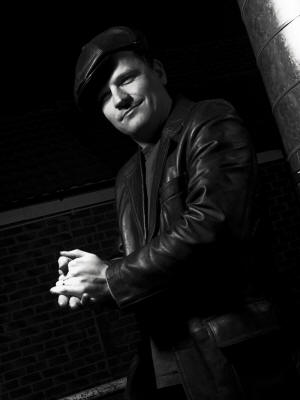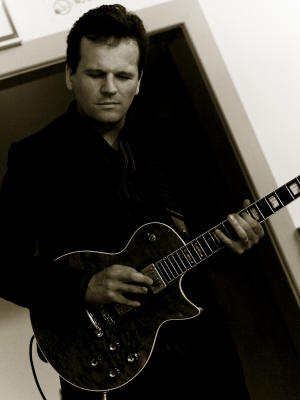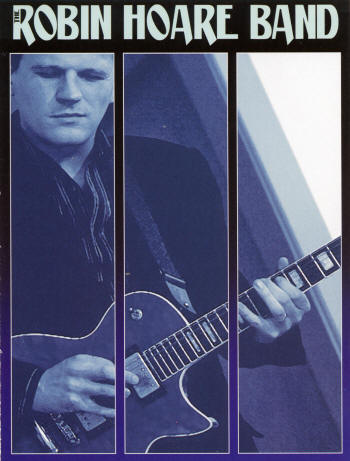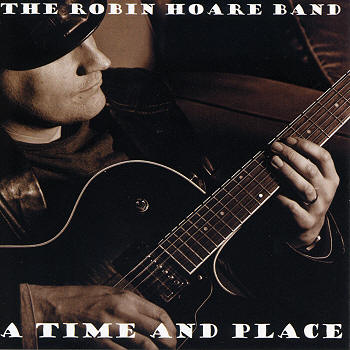|
 Robin, thank you for
sparing the time. Robin, thank you for
sparing the time.
How did you get
started in music?
Both my parents are musical so it was always something I knew I could
try. Classical music and jazz were always around. I remember being very
intrigued by hearing Benny Goodman when I was eleven or so. I heard
Clapton and got into listening to blues related music before my teens.
Then I heard B.B. King and Albert King at 14 and that totally turned my
head. Then I wanted to play blues guitar. They made their instruments
sing. Those guys made playing seem easy. Of course little did I know at
the time, it’d take years to even half understand what they were
doing…or sound good.
Where did you grow
up?
I’m a Sheffielder and I’ve lived here all my life apart from a year or
so when I lived in Glasgow back in the 90s.
Did you always want
to become a musician?
I always liked the idea of playing even from being very young but I
thought I wouldn’t be able to do it. I took the guitar up expecting to
have a lot of fun being not very good. I took to it surprising well and
I worked really hard. By the time I was eighteen or so I was thinking I
may want to earn my living from music. I applied to study a non music
degree and it just wasn’t the right thing for me. So I packed it in and
started teaching the guitar to bring the money in whilst I carried on
gigging.
What kind of material
were you playing in the early days?
I started off playing blues jazz in workshop bands and scratch bands
when I was sixteen or so. I got a lot of early gigs playing in fairly
shambolic scratch bands at the most bizarre events. It veered towards
trad jazz at times and the band leader had a knack of hiring players who
couldn’t keep time! Those gigs were a great laugh most of the time and
to be honest just what I needed. My early mentors were all jazz
musicians, guys like the drummer Peter Fairclough. Both my guitar tutors
were jazz guitarists. I regard myself as blues player. I think like a
jazzer in terms of the neck of the guitar. I was lucky enough to attend
a couple of summer schools with the great Mike Walker who described my
approach to chords as “pianistic”. I prefer to play three or four note
chords rather then big barre chords.
The early blues bands played covers. There are a few songs I still play
today that I started doing back then like “Killing Floor” and Albert
King’s “I’ll Play the Blues for You”. The other guitarist in the band
liked his funk and he got me into it. I’ve loved it ever since. He has a
really open view of music which has really rubbed off on me.
Who are your
favourite blues artists (both old and new)?
Well, I’ll start with the contemporary people and work backwards; Erja
Lyytinen, a great singer, guitarist and writer, Ana Popovic for the way
she mixes in jazz without resorting to pointless noodling, Sean Webster
for the sheer “pin you to the back of the hall” power in his voice,
Clapton, Jimmie Vaughan for pure class and knowing when not to play,
Albert Collins for being my number one guitar hero…that tone gets me
every time, just like those horn arrangements, Buddy Guy, B.B. King,
T-Bone Walker, I love those jazzy chords, Charlie Christian, Django
Reinhardt – I know he’s not blues but guitarists can’t really get away
from his influence even if they don’t realise it. For acoustic blues I
like Bukka White, Rev Gary Davies, Big Bill Broonzy and Robert Johnson.
If you were to ask me the same question next week, some of those names
may change.
Who has influenced
you the most in your music writing?
Larry Garner for writing blues that is relevant now without contriving
it. I heard him and knew I could go on to write. Richard Thompson for
crafty minor chords and helping me get out of the blues box. I love Tony
Joe White for the story songs and his way of putting it all over.
What first attracted
you to the blues?
The honesty of the music. If it’s happy or sad it’s always direct and
it’s all to make you feel better than you do.
What was the best
album you ever bought?
That’s a very tough one. For full on blues guitar I guess “Albert
Collins Live 92-93”, for great songs Larry Garner’s “You’ve got to live
a little.”, for music in general then Richard Thompson’s “You? Me? Us?”
tied with “Fires” by Nerina Pallot.
 Are there any
particular songs that you’ve played that have special meaning to you? Are there any
particular songs that you’ve played that have special meaning to you?
I always try to pick songs that say things I’d say. If you were to take
Albert King’s “I’ll Play the Blues for You” and my song “Ain’t No
Perfect Man” then you pretty much have my blues philosophy in a
nutshell.
What is your
favourite guitar?
My Guild Starfire which is on the album cover [see below] closely
followed by my red Guild Bluesbird.
‘Sheffield’s
favourite bluesman’ according to acclaimed British bluesman King Rollo –
Tell me about the blues scene in Sheffield?
The blues scene in Sheffield has been pretty strong over the last ten
years or so. The standard of the musicians is very high. There are a
number of dedicated people who are willing to put events on like Bob
Swift and Stu Arfield who run the Sheffield Philadelphia Blues Festival.
I also promote other acts from time to time. The scene has also been
helped by the city’s real ale pubs. A lot of them have regular live
music and they form a walk from Hillsborough in the north west of the
city most of the way into the city centre. I would say the mainstays are
the New Barrack Tavern on Penistone Road and the Riverside on Mobray
Street. On any given Friday or Saturday you can catch at least two or
three good live bands in various pubs. There’s a good regular crowd for
the bands in Sheffield. The Boardwalk also puts on some good blues from
time to time and Rudi’s Blues Café in Rotherham is just one of the best
venues I’ve worked in. I guess if you were looking for who to see I’d
have to say check out Billy Martin Junior, who’s a very gifted writer
and performer, the Steve French Band, the Hummingbirds, Grey Cooper and
the musical daddy of most of us, Frank White.
Tell me about the
band, when did you get together?
I’ve been working under my own name since 2002. The backbone of the band
these days is the collaboration between Danny Fox and myself. Danny’s
the most gifted musician I’ve come across. We worked together for a
while way back and really clicked. Then he left playing for a few years
and got back in touch in 2006. He’s unique. We push each other all the
time and pretty much every gig is a blast. We work a duo as well.
Tell me about making
your new album ‘A Time and Place’?
It’s been the most worthwhile experience of my career so far. I could
not have asked for it to have gone better. All the songs are originals
and half of them were written specially for the project. I planned for
it to be a proper produced album with good varied arrangements and
textures. I want it to be something people will come back to. We
recorded and mixed the album in five sessions, a total of about ten
days. I was very fortunate to get everyone I wanted to play on the
album. I’m so happy to have finally made the recording I’ve always
wanted to make.
A lot of music styles
are fads but the blues is always with us. Why do you think that is?
The blues is a roots style like jazz, gospel and folk music. Without it
popular music wouldn’t sound like it does. Amy Winehouse or Duffy or
Leona Lewis would not sound like they do without it. And of course the
language of rock music comes from the blues, gospel, country music and
jazz.
How do you see the
future of blues music?
With the right promotion there are a few people who do well
commercially. I’m thinking about Ana Popovic, Erja Lyytinen, Ian Parker
has been bubbling under for years. I’m very surprised that Joe Louis
Walker was never properly promoted as he’s as good as any of the greats.
Creatively I think rock influenced blues or the kind of punk hobos like
Seasick Steve have the best potential to sell. There’s always an appeal
about raggedy old guys with a beat up guitar and a story to tell. To an
eighteen year old Seasick Steve must seem like he’s from another
universe.
What
are your future plans?
At the moment I’m not looking too far ahead. The main thing is to
promote the album and start working on selling CDs and getting next
years gigs together.
Robin, thank you very
much.


The Robin Hoare
Band album "A Time and Place" is a statement of intent from an artist
who's held in high regard in his home city of Sheffield. After nearly
two decades of building his reputation in his home city and major UK
festivals including the Burnley National Blues Festival, The Great
British R&B Festival and Maryport Blues Festival, he has produced the
album he's capable of producing, the way it should be done. It features
nine original songs and an inspired solo piece from gifted bass
guitarist Danny Fox. Robin is a man for today who sings the blues of
today. From the credit crunch to online gambling addictions, he's
telling it how it is. But you shouldn't think that "A Time and Place" is
going to be a heavy album to listen to. As respected Sheffield
journalist Bill Auckland says; Robin "honours the blues tradition
without being a slave to it". Robin's blues is a funky affair with
biting guitar, killer grooves, uptown horn arrangements ... this is
blues to help you get down, not to get you down. Robin's formative
influences included Albert Collins, Eric Clapton, Buddy Guy, Larry
Garner and Richard Thompson. Hearing Larry Garner, Robin decided to
write blues songs about modern life; he marries them with an adventurous
guitar style. The Robin Hoare Band is known for their instrumental
skills and play the music with infectious enthusiasm.
The album "A Time and Place" can be purchased from:
Neil Ramsden, The Den Hi-Fi, Basement, 38 Cavendish Street, Keighley,
West Yorkshire, BD21 3RG
Tel: 01535 606086
Email and sales: den.hi-fi734@amserve.com
Put 'A
Time and Place' on your CD player, pick up that bottle of Jack Daniels,
grab a glass, pour, sit back and enjoy!
Alan White, earlyblues.com
www.robinhoare.com
myspace.com/therobinhoareband
All photographs used with permission.
Return to
Blues Interviews List
Website, Photos & Text © Copyright 2001-2008 Alan
White. All Rights Reserved.
For further information please email:
alan.white@earlyblues.com
|









 Robin, thank you for
sparing the time.
Robin, thank you for
sparing the time.  Are there any
particular songs that you’ve played that have special meaning to you?
Are there any
particular songs that you’ve played that have special meaning to you?
